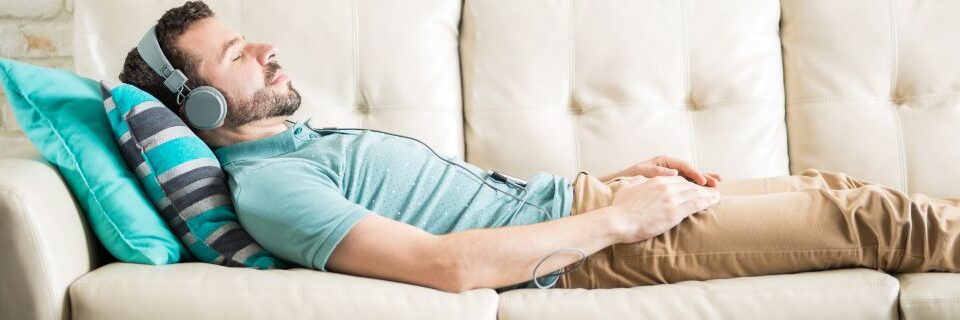
A New You with Online Hypnotherapy

How Hypnosis Can Unlock Your True Potential
Table of Contents
Anyone who has ever suffered from occasional or chronic insomnia knows that falling asleep is not always simple or fast. Sleep can be elusive even at the best of times, and your individual needs and characteristics can affect your sleeping patterns, making it harder to fall asleep or stay asleep. If you are trying to fall asleep and failing, the right tips to beat insomnia can help you fall asleep faster and get the sleep you need.
What Can Impact Your Quality of Sleep?
Most healthy people need about 10 to 30 minutes to fall asleep. This is called the “sleep latency period,” and it does not include your bedtime routine, which can include brushing your teeth, applying lotion, or other pre-sleep habits. This latency period only includes time spent lying in bed, during which you are likely relaxing before you fall asleep. For most people, the time is comparatively brief, but if you need more than 45 minutes to fall asleep, you may have a sleep problem known as insomnia or otherwise poor sleep health or habits. Addressing the issues interfering with your sleep can help you get the sleep you need.
Common factors that can keep you tossing and turning at night include:
- Excessive light
- Shift work
- Certain medical conditions
- Chronic pain
- Anxiety
- An uncomfortable or undesirable sleeping environment
If you spend a lot of time in bed worrying, ruminating, or mulling over the day’s events, you might also have a hard time falling asleep. You may not be able to just “turn off” your mind, but you can adjust your daily routine to make it more sleep-friendly. One of the best ways to do this is by incorporating practices such as hypnotherapy for sleep and other habits that trigger your natural relaxation response.
Self-hypnosis for sleep can help you quiet unwanted thoughts, redirect your focus, and relax your mind so that you can learn how to fall asleep faster.
Tips to Beat Insomnia
When you are trying to fall asleep, finding out how to fall asleep faster and stay asleep longer are likely to be top priorities. Sleep is essential for good health, and when you cannot sleep well, your physical and emotional health can suffer. You might be more prone to anxiety, depression, and poor concentration.
You can learn how to fall asleep faster with a few changes to your daily and nightly routine. During the day, exercise regularly, and limit how often and how long you nap. Although naps can help offset your sleep debt, naps longer than 30 minutes can interfere with your body’s internal clock and make it harder for you to sleep at night.
Try to avoid using large amounts of caffeine, and limit your consumption of caffeine, nicotine, alcohol, and other stimulants within a few hours of bedtime. You will also need to avoid using electronic devices too close to bedtime. These devices can be stimulating and keep you scrolling long past the time you should be falling asleep.
Practicing good sleep hygiene, including maintaining a regular bedtime, having a bedtime routine, and creating a sleep-friendly environment that includes comfortable bedding, proper lighting, and a comfortable temperature are all great habits. Hypnosis for sleep anxiety can also be beneficial, easing your worries and helping you turn off those intrusive thoughts.
How to Fall Asleep Quickly
When it comes to better sleep, no list would be complete without ideas for relaxation. While children often find it easy to fall asleep anywhere and everywhere, we often find it harder to fall asleep as we age and become accustomed to our routines and dependent on having just the right sleeping environment. Incorporating various relaxation techniques into your bedtime routine can help you sleep better.
These techniques can include:
- Progressive relaxation, in which you breathe deeply as you contract and relax the various muscle groups gradually to release stress stored in your body
- Guided imagery, which involves envisioning peaceful memories or images to reduce your stress and calm your mind and body in preparation for sleep
- Mindful meditation, which is used to move your focus to the present and let go of judgment, stress, and negative emotions
- Hypnosis for better sleep, which is used to redirect your focus and alter your concentration to calm your overactive mind, alleviate stress and relax your body so that you can fall asleep naturally faster and more easily
These great ways to get better sleep can be beneficial and may be used alone or together to help you get good sleep. You can also use UpNow’s best sleep hypnosis app whenever and wherever you need it whether you are at home, traveling for work, or traveling for pleasure. It can help you sleep well in any environment.
Developing the tools you need to sleep better does not have to be difficult. With a sleep-friendly environment, good sleep hygiene, and hypnosis for sleep and relaxation, you will be well on your way to healthier, more restful sleep tonight. Visit UpNow.com today to find out more or to download our app.
UpNow Health only uses high-quality sources, including peer-reviewed articles, to support the facts within our articles. All our articles are reviewed by experts to ensure that our content is accurate, helpful, and trustworthy.
1. “American Academy of Sleep Medicine – Association for Sleep Clinicians and Researchers.” American Academy of Sleep Medicine – Association for Sleep Clinicians and Researchers, 2013, https://aasm.org/
2. Exelmans, Liese, et al. “Sleep Latency versus Shuteye Latency: Prevalence, Predictors and Relation to Insomnia Symptoms in a Representative Sample of Adults.” Journal of Sleep Research, vol. 27, no. 6, 23 July 2018, p. e12737, https://doi.org/10.1111/jsr.12737.
3. “External Factors That Influence Sleep | Healthy Sleep.” Healthysleep.med.harvard.edu, https://healthysleep.med.harvard.edu/healthy/science/how/external-factors
4. Jung, Da Woon, et al. “Estimation of Sleep Onset Latency Based on the Blood Pressure Regulatory Reflex Mechanism.” IEEE Journal of Biomedical and Health Informatics, vol. 17, no. 3, 1 May 2013, pp. 534–544, https://pubmed.ncbi.nlm.nih.gov/24592456/, 10.1109/jbhi.2013.2257816.
5. Lemyre, Alexandre, et al. “Pre-Sleep Cognitive Activity in Adults: A Systematic Review.” Sleep Medicine Reviews, vol. 50, Apr. 2020, p. 101253, https://doi.org/10.1016/j.smrv.2019.101253
6. Molen, Yara Fleury, et al. “Insomnia: Psychological and Neurobiological Aspects and Non-Pharmacological Treatments.” Arquivos de Neuro-Psiquiatria, vol. 72, no. 1, 1 Jan. 2014, pp. 63–71, www.scielo.br/scielo.php?pid=S0004-282X2014000100063&script=sci_arttext, 10.1590/0004-282X20130184.
7. Ohayon, Maurice, et al. “National Sleep Foundation’s Sleep Quality Recommendations: First Report.” Sleep Health, vol. 3, no. 1, Feb. 2017, pp. 6–19, www.sleephealthjournal.org/article/S2352-7218(16)30130-9/abstract, 10.1016/j.sleh.2016.11.006.
8. “Relaxation Techniques for Health.” NCCIH, www.nccih.nih.gov/health/relaxation-techniques-what-you-need-to-know












